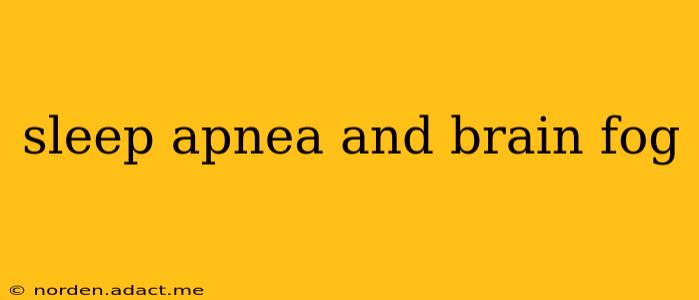Sleep apnea and brain fog are often intertwined, creating a frustrating cycle of poor sleep and daytime cognitive impairment. Understanding this connection is crucial for effective management and improving overall well-being. This article delves into the relationship between sleep apnea and brain fog, exploring the underlying mechanisms and offering strategies for relief.
What is Sleep Apnea?
Sleep apnea is a sleep disorder characterized by pauses in breathing during sleep. These pauses, called apneas, can last from a few seconds to minutes and occur repeatedly throughout the night. There are two main types:
- Obstructive Sleep Apnea (OSA): The most common type, where the airway becomes blocked during sleep, preventing air from reaching the lungs. This is often due to relaxed throat muscles.
- Central Sleep Apnea (CSA): A less common type where the brain fails to send the proper signals to the muscles that control breathing.
The repeated interruptions in breathing lead to oxygen deprivation and fragmented sleep, significantly impacting daytime function.
What is Brain Fog?
Brain fog is a term used to describe a range of cognitive difficulties that affect clarity of thinking. Symptoms can include:
- Difficulty concentrating: Finding it hard to focus on tasks or maintain attention.
- Memory problems: Experiencing forgetfulness, struggling to recall information, or having trouble learning new things.
- Poor judgment: Making decisions that seem illogical or unwise.
- Slowed thinking: Feeling mentally sluggish or experiencing difficulty processing information.
- Fatigue: Persistent tiredness, even after a full night's sleep.
How Does Sleep Apnea Cause Brain Fog?
The link between sleep apnea and brain fog is primarily due to the disrupted sleep architecture caused by repeated apneas. Oxygen deprivation during these pauses leads to:
- Sleep fragmentation: The brain doesn't get the restorative deep sleep it needs for cognitive function.
- Reduced blood flow to the brain: Lack of oxygen restricts blood flow, hindering the brain's ability to function optimally.
- Increased inflammation: Chronic oxygen deprivation and sleep disruption trigger inflammation, which can negatively impact cognitive performance.
- Hormonal imbalances: Sleep apnea disrupts the balance of hormones essential for cognitive function, like cortisol and growth hormone.
Does Sleep Apnea Always Cause Brain Fog?
While sleep apnea significantly increases the risk of brain fog, it doesn't always cause it. The severity of sleep apnea, individual susceptibility, and other contributing factors (like stress, diet, and underlying health conditions) play a role in determining the extent of cognitive impairment experienced.
Can Treating Sleep Apnea Improve Brain Fog?
Yes! Successfully treating sleep apnea often leads to significant improvements in brain fog. By addressing the underlying cause of sleep disruption and oxygen deprivation, the brain can regain its optimal function. Treatment options include:
- Continuous Positive Airway Pressure (CPAP): A machine that delivers pressurized air through a mask to keep the airway open during sleep.
- Oral appliances: Custom-made devices that reposition the jaw and tongue to prevent airway blockage.
- Surgery: In some cases, surgery may be recommended to widen the airway.
- Lifestyle changes: Weight loss, avoiding alcohol and sedatives before bed, and adopting good sleep hygiene practices can also help.
What Other Conditions Can Cause Brain Fog?
Brain fog isn't solely caused by sleep apnea. Other potential causes include:
- Thyroid problems: Hypothyroidism and hyperthyroidism can both contribute to cognitive impairment.
- Depression and anxiety: Mental health conditions often manifest as brain fog.
- Vitamin deficiencies: Deficiencies in B vitamins, vitamin D, and others can affect cognitive function.
- Chronic fatigue syndrome: This debilitating condition is often associated with significant brain fog.
- Medications: Certain medications can have cognitive impairment as a side effect.
How Can I Tell if My Brain Fog is Related to Sleep Apnea?
If you suspect your brain fog is linked to sleep apnea, you should consult a doctor. They can perform tests, such as a sleep study (polysomnography), to diagnose sleep apnea and determine the severity. Be sure to mention your brain fog symptoms during your consultation.
What are the Long-Term Effects of Untreated Sleep Apnea?
Untreated sleep apnea can lead to serious long-term health consequences, including:
- Cardiovascular disease: Increased risk of high blood pressure, heart attack, stroke, and heart failure.
- Type 2 diabetes: Sleep apnea can disrupt blood sugar regulation.
- Mood disorders: Increased risk of depression and anxiety.
- Cognitive decline: Chronic sleep deprivation and oxygen deprivation can contribute to long-term cognitive impairment, including an increased risk of dementia.
By understanding the relationship between sleep apnea and brain fog, individuals experiencing cognitive difficulties can take proactive steps towards diagnosis and treatment. Addressing sleep apnea effectively can greatly improve cognitive function and overall quality of life. If you are experiencing symptoms of sleep apnea or brain fog, consulting a healthcare professional is crucial for accurate diagnosis and personalized treatment.
